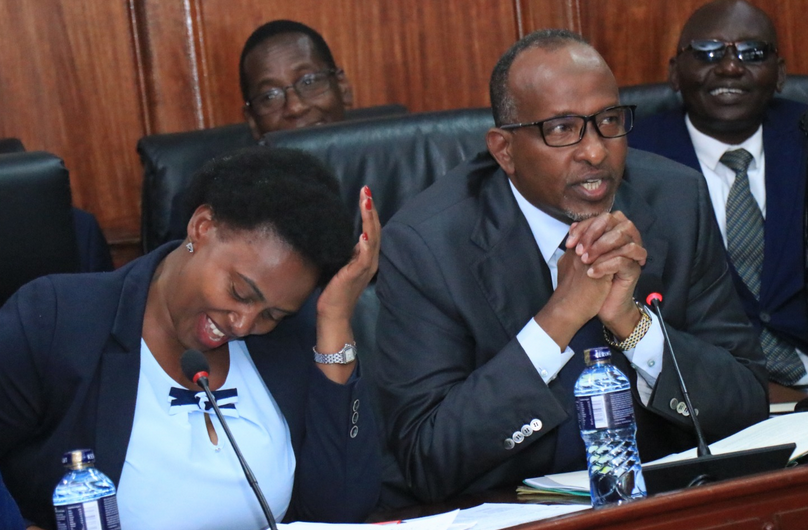
 Public Health and Professional Standards PS Mary Muthoni and Health Cabinet Secretary Aden Duale when they appeared before National Assembly’s Departmental Committee on Health on May 15, 2025/HANDOUT
Public Health and Professional Standards PS Mary Muthoni and Health Cabinet Secretary Aden Duale when they appeared before National Assembly’s Departmental Committee on Health on May 15, 2025/HANDOUTThe Ministry of Health has raised a red flag over a looming Sh22.7 billion funding shortfall that could jeopardise critical healthcare initiatives under Universal Health Coverage in 2025/26 financial year.
Appearing before the National Assembly’s Departmental Committee on Health, Cabinet Secretary Aden Duale and Principal Secretary for Public Health and Professional Standards Mary Muthoni urged Parliament to increase allocations to the health sector, warning that current budget provisions fall drastically short of the sector's needs.
The State Department for Public Health and Professional Standards has been allocated Sh31.34 billion in the 2025/26 draft budget estimates—just 22.91 per cent of the total health sector budget of Sh136.79 billion.
However, the Ministry had initially submitted a funding requirement of Sh70 billion, leaving a gaping Sh38.7 billion deficit. Of this, Sh22.7 billion has been flagged as critical to sustaining key health reforms and operations.
Top among the initiatives at risk are the recruitment and stipend support for more than 5,400 medical interns, the remuneration of 107,831 Community Health Promoters (CHPs), and operational costs for newly established health agencies.
 Public Health and Professional Standards PS Mary Muthoni and Health Cabinet Secretary Aden Duale when they appeared before National Assembly’s Departmental Committee on Health on May 15, 2025/HANDOUT
Public Health and Professional Standards PS Mary Muthoni and Health Cabinet Secretary Aden Duale when they appeared before National Assembly’s Departmental Committee on Health on May 15, 2025/HANDOUTAn extra Sh150 million is also needed to support the administration and monitoring of the CHP programme—an initiative aimed at reinforcing preventive and community-based healthcare.
The ministry is also seeking Sh250 million to operationalise the State Department for Public Health and Professional Standards, established under Executive Order No. 1 of 2023.
“The implementation of Kenya’s health transformation is hinged on properly resourced institutions. Without adequate funding, we risk having good policies on paper that do not benefit citizens,” warned Duale.
Several key presidential directives now hang in the balance due to budgetary constraints.
 Health committee chair James Nyikal during the National Assembly’s Departmental Committee on Health on May 15, 2025/HANDOUT
Health committee chair James Nyikal during the National Assembly’s Departmental Committee on Health on May 15, 2025/HANDOUTThe ministry is requesting Sh900 million to bolster KMTC staffing and Sh680 million to maintain the HELB sponsorships that have, since FY2022/23, supported 22,342 needy students.
Further compounding the funding crisis, the Pharmacy and Poisons Board (PPB)—the country’s pharmaceutical regulator—is grappling with a Sh206 million deficit. The funds are crucial to its transition into the Kenya Health Products and Technologies Regulatory Authority (KHPTA) and to meet WHO’s Maturity Level 3 standards.
In a concerning development, the Ministry also reported a Sh1.09 billion cut in recurrent funding to Semi-Autonomous Government Agencies (SAGAs), including the Kenya Medical Practitioners and Dentists Council, Kenya Nuclear Regulatory Authority, and KMTC.
With health reforms under the BETA agenda and UHC framework at stake, the Ministry is now appealing to Parliament for urgent intervention.
“The success of the UHC and BETA health agenda depends on this House. We cannot operationalise health reforms if we continue to underfund the sector,” Duale emphasised.
The Committee on Health is expected to deliberate on the Ministry’s appeal in the coming weeks, as Parliament finalises the 2025/26 budget estimates.











